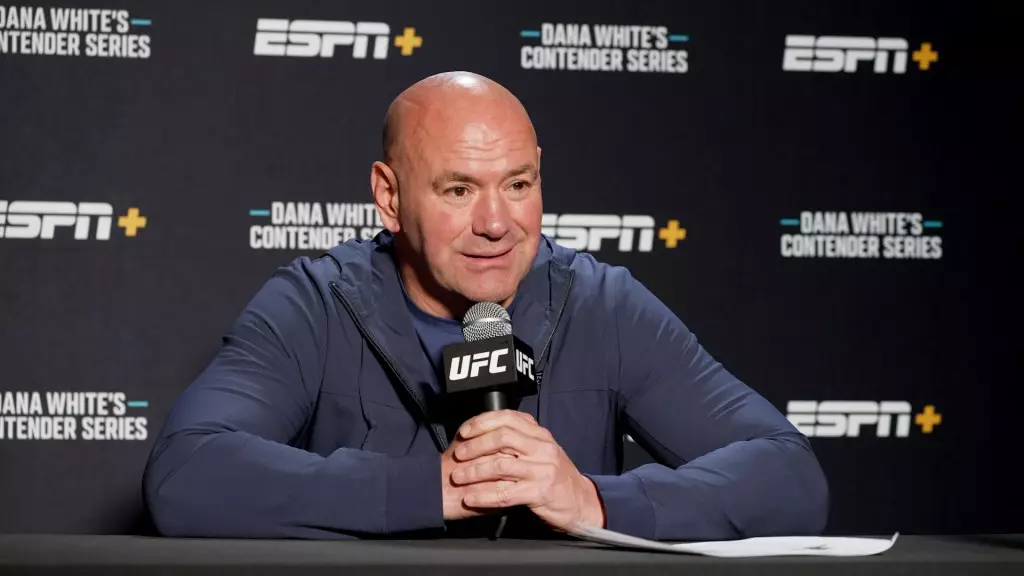Dana White has long been a polarizing figure in the world of combat sports—his tenure as the CEO of the Ultimate Fighting Championship (UFC) changing the landscape of mixed martial arts (MMA) forever. However, recent developments hint that he may be on the brink of pivoting into the boxing sector, raising questions about the state of the sport and what White can bring to the table.
In 2017, White hinted at a foray into boxing, sporting a Zuffa Boxing t-shirt, a venture that soon faded into the background as his criticisms of the sport came to the forefront. Fast forward to 2024, and White appears ready to dust off that t-shirt, proclaiming, “I’m in,” with an enthusiastic flair during a promotional event for rising Irish boxer Callum Walsh in Dublin. The initial barriers he faced seem to have somehow dismantled, paving the way for a comeback that many in the boxing community never saw coming.
White’s past skepticism toward boxing’s operational methods—including a tendency to critique its promotion and fighter compensation—now appears to be morphing into opportunity. His declaration that “everything is about timing” suggests a meticulous approach to entering an arena White previously viewed with hesitation. While he has yet to reveal the specifics of his boxing plans—the athletes involved, the venues, or even fight cards—there are hints of significant ambition.
During a recent Q&A session, White expressed resolute confidence that he possesses a strategic plan for his boxing venture, one that is distinct yet inspired by the highly successful UFC model. He remarked on the “demise of boxing” that has been prophesied for decades yet remains a viable sport. This raises a compelling question: Can White’s method of tightly controlling the fight landscape through contracts and partnerships succeed in boxing, where promoter competition is rampant?
He has indicated a willingness to collaborate with established boxing figures, yet his reluctance to associate with certain promoters hints at a potential for disruption. White’s commentary betrays a clear vision—not only to retain the excitement of fight promotions but to also emphasize fluid scheduling that prioritizes a speedy fight night experience. This is not merely cosmetic; it’s aimed at rejuvenating the boxing fan experience that has, at times, felt weighed down by tedious intermissions and prolonged promotions.
White spoke about ways to bring successful UFC elements to boxing, such as streamlining fight nights. He criticized the traditional boxing approach which often drags on, lamenting the needless pauses between bouts. For him, this is a cue that boxing must evolve—failing to innovate could result in further disengagement from fans. The boxing community would do well to remain attentive; White asserts he knows the recipe for success and is ready to shake up the status quo.
In the world of MMA, UFC fighters are often exclusive to the promotion, leading to streamlined matchmaking and the emergence of cohesive rivalries. White seems to believe that a similar structure could exist in boxing, thus offering more high-stakes fights without the bureaucratic entanglements commonly seen in the current boxing landscape. The fundamental question looms: Is elite boxing ready to surrender some control to a promoter aiming for monopolistic tendencies?
As White prepares to move forward with his plans, the timeline stretches into 2025, suggesting a deliberate build-up to what could be one of the most significant shifts in boxing promotion. With his contentious yet successful track record in MMA, the boxing world should brace itself for a potential upheaval, especially considering how deeply entrenched traditional practices are in the sport.
Nonetheless, skepticism is warranted. The reality of boxing’s structure is complex, steeped in a history fraught with conflict between promoters and governing bodies. As White prepares to claim his stake, questions remain regarding how he intends to navigate these dynamics. Can he truly replicate his UFC success within the boxing framework, a sport with multiple stakeholders and long-standing rivalries?
Dana White’s imminent re-entry into boxing promotion symbolizes both a risk and an opportunity. He’d bring a fresh perspective but must contend with a deeply-rooted ecosystem that has resisted significant change. For fight fans, the coming years will not only test White’s ambitions but will also reveal if a new era in boxing can indeed emerge from the ashes of its traditional methods. Only time will tell if he can truly “come in guns blazing” and deliver the boxing renaissance he promises.

